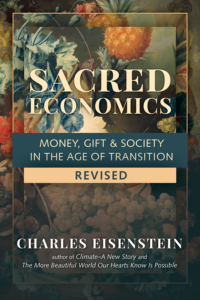Climate — A New Story
Chapters
Chapter 2: Beyond Climate Fundamentalism
The Social Climate
While most environmentalists also care deeply about social justice, environmental narratives and particularly the climate narrative often suggest that social issues are of secondary importance compared to the grand mission to save the planet. Earlier I observed that this call for sacrifice to fight an overarching threat is identical to the way war is used to override social justice movements. “Stop whining—don’t you know there’s a war on?” My associate Marie Goodwin once asked a prominent climate crusader, “But don’t you think community-building is also important today?” He replied, “Not really. If we don’t put everything we’ve got into stopping climate change right now, we won’t have any community to build.” This pattern of thinking that climate change shares with war, I said, should make us alert. Now I am making a further point. It is not that “social justice is important too” (leaving unsaid, “but not as important as saving the planet”). It is that social healing is indispensable in ecological healing.
First and most obviously, it is indispensable because it is hard to effectively enact love for others when one is hurting desperately oneself. A hurting person usually passes on that hurt to those they love, helplessly. Contrary to what the more fortunate among us might think, when the alcoholic man abuses his children it is not because he loves them less than we love our own children. As with a hurting person, so with a hurting society. We cannot expect a miserable, oppressed populace to exercise much care for anything outside its immediate survival and security. While the poor are kept in a state of survival anxiety through sheer deprivation, the rich suffer poverty of another kind: lack of community, connection, meaning, and intimacy, which can cause severe psychological stress even in conditions of material plenty.
Most human suffering on this planet comes not from unavoidable tragedies like accidents and natural disasters, but from human beings themselves. Human trafficking and sweatshop labor, political violence and domestic abuse, racial oppression and gender violence, poverty and war … all co-arise with our systems, our perceptions, and our narratives. These narratives are born of trauma and give birth to trauma.
Herein lies a link between economic justice, social justice, and the environment. We will continue to abuse our fellow beings, even our own Mother Earth, as long as we carry unhealed social traumas. This does not mean “heal our traumas first before we try to heal the environment.” It is to recognize that social healing and ecological healing are the same work. Neither is to be privileged over the other; neither can succeed without the other.
From the causal logic of interbeing—morphic resonance—it is easy to understand how a society that exploits and abuses its most vulnerable will also exploit and abuse nature. To take care of vulnerable people generates a field of care that facilitates care for other vulnerable beings. A caring society is one that is habituated to asking, “Who is being left out? Who is suffering? Who is unrecognized in their gifts? Whose needs are not being met?” These are the questions that must guide an ecological society as well as a just society.
The term “social justice” may be too narrow to encompass the kinds of social healing that must happen for us to be able to fully enact our love for the planet. Traditional areas of social activism that aim to address racism, poverty, inequality, misogyny, and so forth are important but they leave unchallenged key institutions like education, medicine, money, and property, often engaging them only in terms of equal access. It is a very tepid form of activism to strive for the equal application of existing systems, when the systems themselves are inherently oppressive whatever the race, gender, or sexual orientation of their subjects.
Is what feminists want, that women have equal representation in the ranks of polluters, vulture fund CEOs, sweatshop owners, and slumlords? Is what Black Lives Matter activists want, that the school-to-prison pipeline be open as widely to whites as to blacks in a punishment-oriented carceral society? I suppose if we take the current system for granted, then the answer would be yes. If we take for granted a horrible concentration of wealth, then certainly all races should have equal odds of being in the elite or the underclass. If we take for granted a global war machine, then I suppose women should be allowed to be generals just as men are. If we take for granted a planet-wrecking economy, then female, gay, black, disabled, and transgendered people should be just as welcome at its helm as white males.
While they surely would protest at the above suppositions, the liberal media upholds them implicitly by celebrating every time a female superhero gets to kick ass in a film, or a government appoints black, gay, or female people to high positions. But the original feminist and racial justice radicals had a bigger vision than winning equality in the existing system. The feminists didn’t want just to have equal status in the patriarchy; they wanted to transform the whole system. Civil rights leaders like Malcolm X and Martin Luther King Jr. didn’t just want African American men to be treated equally in the United States military; they wanted to end militarism and imperialism altogether. But today, a neutered mainstream version of both civil rights and feminism settles for an anodyne ideal of equality, shifting the occupants of our power structures around but leaving the structures themselves intact. They seem not to realize that these structures necessitate inequality, whether delineated by race, gender, or some other distinction. An exploitative system requires some people to be exploited. Racial prejudice, male chauvinism, nationalism, etc., enable and justify such a system, but eliminating these forms of bigotry won’t change the underlying dynamics. Someone else will be exploited instead.
I visit this issue for two reasons. First, I want to make clear that social justice must be more than the usual grab bag of identity politics issues. The kind of social healing we need requires the massive overhaul, probably the total reformation, of our systems of medicine, education, birth, death, law, money, and government. Second, the same pattern of reaching for superficial changes that don’t disturb the underlying system afflicts environmentalism just as much as it does social justice. So, just as a company can hire black, female, and LBGTQ executives at headquarters to administer a supply chain that exploits dark-skinned people in overseas factories and believe itself to be progressive, so also can it offset its carbon emissions by paying into a reforestation fund, all the while sourcing environmentally toxic products, and still call itself green.
The point is not to condemn the green rationalizations of corporations (or you or me); it is to illuminate the mindset of fundamentalism that enables those rationalizations. Fundamentalism of all kinds is a disengagement from the complexity of the real world, and I am afraid it is ascendant in many realms, not only religion. I even see it in various theories in alternative medicine, in the form of the Great Revelation of the One True Cause of all disease. (It’s parasites! Inflammation! Stress! Acidosis! Trauma!) Fundamentalism offers certainty, a lockdown of thought into a few prescribed pathways. The rush to The Cause, the retreat to unquestioned axioms taken on faith, does not serve us in a time of the disintegration of so much of what we thought we knew.
If we continue to uphold climate fundamentalism, then the symptomatic fever of climate change will only worsen, whatever macroscopic measures we take to address its proximate causes. We might get the numbers down (temperature, greenhouse gases); yet, like the patient who goes to the doctor and is told, “The tests all say you are healthy,” the disease will emerge in what we choose not to measure, what we cannot measure, or what is unmeasurable. We have to go beneath symptoms, and restore the foundation of ecological health: the soil, the water, the trees, and fungi, the bacteria, and every species and ecosystem and human culture on earth.






